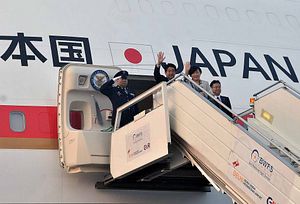When Japanese Prime Minister Shinzo Abe arrives in India next week for the annual bilateral summit with his Indian counterpart, a lot will be at stake for both Tokyo and New Delhi as recent developments in the region, especially on the security front, have tested their diplomatic acumen and strategic maturity.
While India was embroiled in the standoff over Doklam with China, which has since been resolved, North Korea’s shenanigans have upset the security dynamics in Northeast Asia. Pyongyang’s recent hydrogen bomb test and its overflight of a missile over Japan have forced Tokyo to take another look at its options on how to deal with this problem.
During this upcoming visit, Abe will be laying the foundation stone for the construction of India’s first high-speed railway corridor between India’s commercial capital, Mumbai, and Ahmedabad in Gujarat. Abe has been looking to export Japan’s famed shinkansen (bullet train) technology and after the setback in Indonesia, where Japan lost out to China, India represents good tidings for the Japanese railway sector and assorted industries.
Under Abe, Tokyo is also trying to claw its way back into the high-stakes tussle for influence in the Indian Ocean region, particularly in the light of Beijing’s growing aggressiveness in the region. Tokyo’s “Free and Open Indo-Pacific Strategy” is critical to its economic security and stability. At the same time, the construction of the Hambantota port in Sri Lanka by China was a wake-up call for New Delhi as Beijing has now entered what many in India considered as its own backyard.
Meanwhile, India’s non-participation in Beijing’s signature One Belt, One Road (OBOR) initiative has put the onus on New Delhi to offer alternate models of infrastructure development. While it is doing so with projects like the India-Myanmar-Thailand (IMT) trilateral highway, it is also teaming up with Japan in the Asia-Africa Growth Corridor (AAGC) initiative, which aims to pool together Indian and Japanese expertise and funding in building infrastructure in Africa. Japan also has the “Partnership for Quality Infrastructure” initiative which aims to build quality infrastructure in Asia.
A maritime security deal is also on the cards given their growing cooperation in the maritime realm. Earlier in July this year, India, Japan, and the United States had brought in their biggest naval assets to the Malabar naval exercises in the Bay of Bengal. Given that Japan maintains a base in Djibouti and the Indian Ocean is a key conduit for the net energy importer, a maritime cooperation deal could mark a new high in the maritime ties between India and Japan. The two nations have also been holding a bilateral naval exercise, the JIMEX, since 2012.
Another big area of cooperation could be in the field of civilian nuclear energy, given that the Japan-India civilian nuclear deal recently came into force. This is a big leap of faith for Japan as the only country to have suffered from the impact of atomic weapons, especially since India is not a signatory to the Nuclear Non-Proliferation Treaty (NPT).
On the flip side, during this trip, it remains to be seen whether Japan and India can clinch a deal for the supply of Japanese-made US-2i maritime reconnaissance aircraft, which has been stuck for many years now.
Additionally, Japan is the only country to have been allowed to invest in Northeast India and the Andaman and Nicobar islands and this special consideration given to Japan is testimony to the growing camaraderie between the two nations. In fact, Japan was the first country where Prime Minister Modi paid a bilateral visit beyond India’s immediate neighborhood after taking office in May 2014 and since then he has developed a close rapport with his Japanese counterpart.
Hence, given the huge commonality of their interests, Abe’s upcoming India trip could very well set the tone for the next stage of the Japan-India relationship.
Rupakjyoti Borah (@rupakj) is with the Institute of South Asian Studies at the National University of Singapore (NUS). His latest book is The Elephant and the Samurai: Why Japan Can Trust India? The views expressed are personal.

































